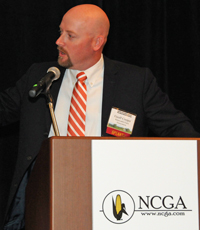A conference on land use and carbon impacts of corn ethanol held this week in St. Louis offered a broad view of a significant topic as Washington braces to continue debates on climate change legislation and the future of ethanol.
 Geoff Cooper with the Renewable Fuels Association moderated the first panel at the conference sponsored by the National Corn Growers Association. That panel focused on the modeling used to determine land use change and Cooper says the panel participants pointed out how difficult this can be. “It’s a new area of study and certainly new to a regulatory framework,” Cooper said. “Using these models for these purposes involves lots of subjective decisions and judgement calls and when you put that in the context of a regulation, that’s problematic.”
Geoff Cooper with the Renewable Fuels Association moderated the first panel at the conference sponsored by the National Corn Growers Association. That panel focused on the modeling used to determine land use change and Cooper says the panel participants pointed out how difficult this can be. “It’s a new area of study and certainly new to a regulatory framework,” Cooper said. “Using these models for these purposes involves lots of subjective decisions and judgement calls and when you put that in the context of a regulation, that’s problematic.”
Cooper says it is important to improve the science behind lifecycle analysis. “These models are only as good as the assumptions you are able to put into them,” Cooper said. “In terms of the indirect land use change analysis, we’re just trying to understand how these models work and replicate the results, and that has been a tough thing to do.’
Cooper says the value of the conference was to let corn growers know the impact that these emerging regulations could have on them in the future.
Listen to or download an interview with Geoff Cooper here:

